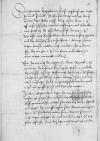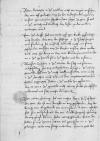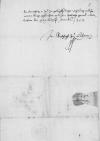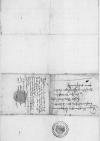Wir haben negst durch unsern diner Ewer Irbarkeit uff unser ⌊⌋ ⌊⌋ entfhangen / und bedancken uns hochlich / der besunderen gunst, / die uns Ewer Irbarkeit ins erste, was die schuldener der armen unsers spitals / und das bauholcz zcw unser kÿrchen belangt, / freuntlichen bewisen. / Wollen ouch mit allem fleis daran sein, / das wir gen Ewer Irbarkeit mit keiner undanckparheit ummer mugen vormerckt werden etc.
Es hot uns ouch der achtpar her ⌊doctor Reÿnek⌋ Ewer Irbarkeit vornemen, / die zwsamne kommung zw ⌊Posen⌋ etc. entdeckt, / das wir fast erfreuet. / Hoffen ouch, das durch Ewer Irbarkeit solcher erlicher / zw gut ⌊koniglicher maiestet⌋, unserm allergnedigsten / hern, / und uns allen nuczlicher handel / muge vortgestelt werden / unnd Ewer Irbarkeit vil grosser gunst und lieb wirt machenn. /
In korcz beigewichnen tagen hot uns hie ⌊Pawl Fasolt⌋ unsers gunstigen hern und frundes, ⌊bischoffs zw Krakau⌋, ⌊⌋ geantwurt, / im welchen sein lieb uns vor in schreibt / und begert, / das wir uff negsten sant Bartolmes tag im beÿ Ewer Irbarkeit furderlich wolten sein, / das wir seiner liebst nicht mugen vorsagen, / die weil wir zuvor beÿ Ewer Irbarkeit uns haben beflissen, domit die sache mocht hingelegt werden. / Bitten derwegen, Ewer Irbarkeit wold es nicht vor ungut ansehen, / das wir uff gedochten tag zw der underhandlung einen unserer secretarien schickten. / Wir segen jo gern, / so vil Ewer Irbarkeit erlich und leidlich, / das disser widerwillen vortragen wurd.
Ewr Irbarkeit briffe hab wir vorlengst gen ⌊Krako⌋ gefertigt, / ouch doneben / was uns der selbtigen Ewer Irbarkeit sache zw gut und furdrung hot nuczlich bedunckt / nicht ane fleis geschriben. / Vorsehen uns im korczen unsers boten widerumb. / Was beÿ deme an uns wirt kommen zwantwurt oder an Ewer Irbarkeit gehorend, / sol Ewer Irbarkeit haben mit den erstenn. /
⌊Meÿster Crÿspin⌋, Ewer Irbarkeit moler, der sich mit seinem mitgesellen / beÿ uns wolgehalten, / bringt Ewer Irbarkeit etliche gemelde, / die Ewr Irbarkeit / nicht wer misfallen. / Wirt ouch Ewer Irbarkeit berichten, wies uns mit dem ⌊amptvorwalter⌋ zur ⌊Eÿlau⌋ ergangen. / Bitten, Ewer Irbarkeit wolde im gestatenn, / das er von Ewer Irbarkeit gemelde nicht wenig stucke zw besehen widerumb mit sich mochte bringen etc.
Von neuen czeitung / hab wir nichts, das Ewer Irbarkeit zwschreÿben wer. / Es ist von ⌊Danczke⌋ an uns geschriben, / das der ⌊konig von Engellandt⌋ von einem seiner rittern erstochen solt sein / und sunst vil den von ⌊Lubke⌋ zw guth. / Czeitung, die aus gunst kommen, / haben wenig glouben. / Bitten derhalben, so aus jennen orttern vil gewissere an Ewer Irbarkeit gelangen, / wolt uns solche mitteilen. / Hiemit gebe Got der almechtig Ewer Irbarkeit in gelugkseliger regirung und zwnemen lange gesuntheit und sein gotliche genad. /



